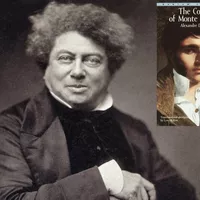Chapter 12. Father and Son (1)
"Didn't I say that your police were good for nothing?" "Yes; but they may catch him yet." "True," said Noirtier, looking carelessly around him, "true, if this person were not on his guard, as he is;" and he added with a smile, "He will consequently make a few changes in his personal appearance." At these words he rose, and put off his frock-coat and cravat, went towards a table on which lay his son's toilet articles, lathered his face, took a razor, and, with a firm hand, cut off the compromising whiskers. Villefort watched him with alarm not devoid of admiration.
His whiskers cut off, Noirtier gave another turn to his hair; took, instead of his black cravat, a colored neckerchief which lay at the top of an open portmanteau; put on, in lieu of his blue and high-buttoned frock-coat, a coat of Villefort's of dark brown, and cut away in front; tried on before the glass a narrow-brimmed hat of his son's, which appeared to fit him perfectly, and, leaving his cane in the corner where he had deposited it, he took up a small bamboo switch, cut the air with it once or twice, and walked about with that easy swagger which was one of his principal characteristics. "Well," he said, turning towards his wondering son, when this disguise was completed, "well, do you think your police will recognize me now." "No, father," stammered Villefort; "at least, I hope not." "And now, my dear boy," continued Noirtier, "I rely on your prudence to remove all the things which I leave in your care." "Oh, rely on me," said Villefort. "Yes, yes; and now I believe you are right, and that you have really saved my life; be assured I will return the favor hereafter." Villefort shook his head.
"You are not convinced yet?" "I hope at least, that you may be mistaken." "Shall you see the king again?" "Perhaps." "Would you pass in his eyes for a prophet?" "Prophets of evil are not in favor at the court, father." "True, but some day they do them justice; and supposing a second restoration, you would then pass for a great man." "Well, what should I say to the king?" "Say this to him: 'Sire, you are deceived as to the feeling in France, as to the opinions of the towns, and the prejudices of the army; he whom in Paris you call the Corsican ogre, who at Nevers is styled the usurper, is already saluted as Bonaparte at Lyons, and emperor at Grenoble. You think he is tracked, pursued, captured; he is advancing as rapidly as his own eagles. The soldiers you believe to be dying with hunger, worn out with fatigue, ready to desert, gather like atoms of snow about the rolling ball as it hastens onward. Sire, go, leave France to its real master, to him who acquired it, not by purchase, but by right of conquest; go, sire, not that you incur any risk, for your adversary is powerful enough to show you mercy, but because it would be humiliating for a grandson of Saint Louis to owe his life to the man of Arcola, Marengo, Austerlitz.' Tell him this, Gerard; or, rather, tell him nothing. Keep your journey a secret; do not boast of what you have come to Paris to do, or have done; return with all speed; enter Marseilles at night, and your house by the back-door, and there remain, quiet, submissive, secret, and, above all, inoffensive; for this time, I swear to you, we shall act like powerful men who know their enemies. Go, my son--go, my dear Gerard, and by your obedience to my paternal orders, or, if you prefer it, friendly counsels, we will keep you in your place. This will be," added Noirtier, with a smile, "one means by which you may a second time save me, if the political balance should some day take another turn, and cast you aloft while hurling me down. Adieu, my dear Gerard, and at your next journey alight at my door." Noirtier left the room when he had finished, with the same calmness that had characterized him during the whole of this remarkable and trying conversation. Villefort, pale and agitated, ran to the window, put aside the curtain, and saw him pass, cool and collected, by two or three ill-looking men at the corner of the street, who were there, perhaps, to arrest a man with black whiskers, and a blue frock-coat, and hat with broad brim.
Villefort stood watching, breathless, until his father had disappeared at the Rue Bussy. Then he turned to the various articles he had left behind him, put the black cravat and blue frock-coat at the bottom of the portmanteau, threw the hat into a dark closet, broke the cane into small bits and flung it in the fire, put on his travelling-cap, and calling his valet, checked with a look the thousand questions he was ready to ask, paid his bill, sprang into his carriage, which was ready, learned at Lyons that Bonaparte had entered Grenoble, and in the midst of the tumult which prevailed along the road, at length reached Marseilles, a prey to all the hopes and fears which enter into the heart of man with ambition and its first successes.

